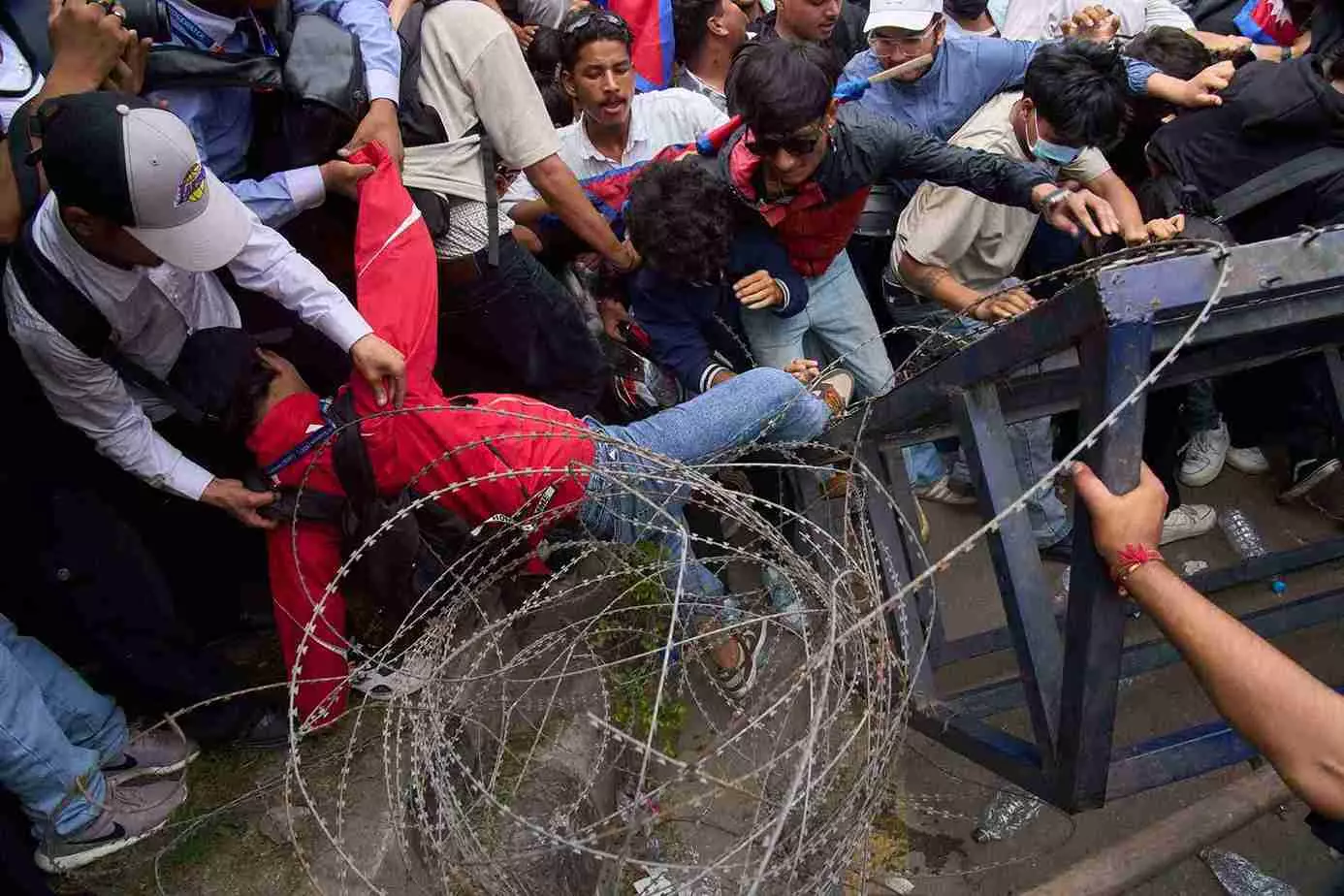
Nepal protests leave 19 dead: Why has Gen Z taken to the streets in revolt?
Thousands of students clash with riot police in front of Parliament in Kathmandu after government blocks 26 social media platforms.

Thousands of young Nepalis in Kathmandu, many in their school and college uniforms, took to the streets on Monday (September 8) to march to the country’s Parliament, to protest against government corruption and the recent ban on popular social media sites.
At least 19 people were killed and 42 others injured when last reports came in.
Thousands of youths, including school students, under the banner of Gen Z, clashed with the riot police in front of the Parliament building in Kathmandu.
The young protestors were carrying national flags and placards with slogans such as “Shut down corruption and not social media”, “Unban social media”, and “Youths against corruption”, written on them.
However, they were stopped by the police, who erected barbed wire barricades. When the protestors breached these barricades, they clashed with the security forces, leading to the death of one person and many others were injured, said reports. The authorities have now imposed a curfew in key locations, including the Parliament area.
What triggered protest?
On Friday, Nepal suddenly blocked access to 26 major social media platforms, including Facebook, YouTube, and X, after authorities cracked down on sites that failed to register with the country's Ministry of Communications and Information Technology.
The Nepal government decided to ban these platforms after these companies refused to register with the government and endorse a move to bring their users under state vigilance via a directive and law it plans to bring about.
Also read: Curfew lifted in East Kathmandu; over 100 pro-king demonstrators arrested for vandalism
While the government claims the ban is a matter of regulatory compliance, protesters demonstrators see it as a deliberate attempt to silence dissent and stifle critical discourse.
Anger against corruption
Besides the ban on social media sites, the Gen Z movement, as it is now called, stems from simmering anger over corruption and economic inequality. The government’s ban on social media acted as the final straw, driving Nepal’s digital-savvy youth from online spaces to the streets in a bold and unified act of resistance.
Despite the blackout on certain social media sites, Gen Z activists turned to alternative platforms such as TikTok and Reddit to mobilise the crowds. Thousands of young demonstrators gathered waving flags, singing the Nepali anthem and chanting slogans against the government, the ban and its policies. The march began at Maitighar Mandala and advanced towards the Parliament building when the clashes broke out and the protest turned violent.
Dominated by Gen Z
The protestors were largely young people below the age of 26 carrying flags and placards with slogans such as "Independent voice is our right" and "Where has the taxpayers' money gone?" Stop the ban on social media, stop corruption not social media,” the crowds chanted, waving the red and blue national flags.
Demand change
One student told the media that they were triggered by the social media ban, but that is not the only reason they were gathered there. According to students, they were protesting against corruption that has been "institutionalised" in Nepal.
The protestors declared that they wanted to see change and though others have endured this divide, they wanted to put an end to the injustices with their generation.
Also read: Nepal: One killed, 15 hurt as pro-monarchy supporters clash with cops
Despite the blackout of several major platforms, TikTok remains active, and users have wasted no time flooding it with viral content that starkly contrasts the everyday hardships of ordinary Nepalis with the opulent lives of politicians’ children. The government is afraid that movements which happened abroad against corruption might happen here as well.
Government’s defence
Defending its move, the government released a statement on Sunday, insisting it respected freedom of thought and expression, while also pledging to ensure a secure environment for citizens’ rights online.
According to a notice issued by the ministry, social media companies were given seven days from August 28 to register. However, even after the deadline expired on Wednesday night, none of the major platforms, including Meta (Facebook, Instagram, WhatsApp), Alphabet (YouTube), X (formerly Twitter), Reddit, and LinkedIn, had submitted their applications.
The Nepali cabinet had earlier instructed affected companies to register locally within seven days, appoint grievance officers, and establish points of contact in the country. This decision followed a Supreme Court order issued in September last year, said reports.
PM responds
Meanwhile, Prime Minister KP Sharma Oli defended the government’s decision to ban unregistered social media platforms.
Speaking at a convention of the ruling Communist Party of Nepal (Unified Marxist-Leninist), Oli said the party would “always stand against anomalies and arrogance, and never accept any act that weakens the nation.”
Nepal's earlier restrictions
Nepal has imposed restrictions on online platforms before. Telegram was blocked in July due to concerns over online fraud and money laundering.
TikTok too had faced a nine-month suspension, which was lifted last August once the company agreed to abide by Nepali regulations.
"The independence of the nation is greater than the loss of jobs of a handful of individuals. How can it be acceptable to defy the law, disregard the constitution, and disrespect national dignity, independence, and sovereignty,” said Oli, responding to the opposition to the ban on social media sites.

